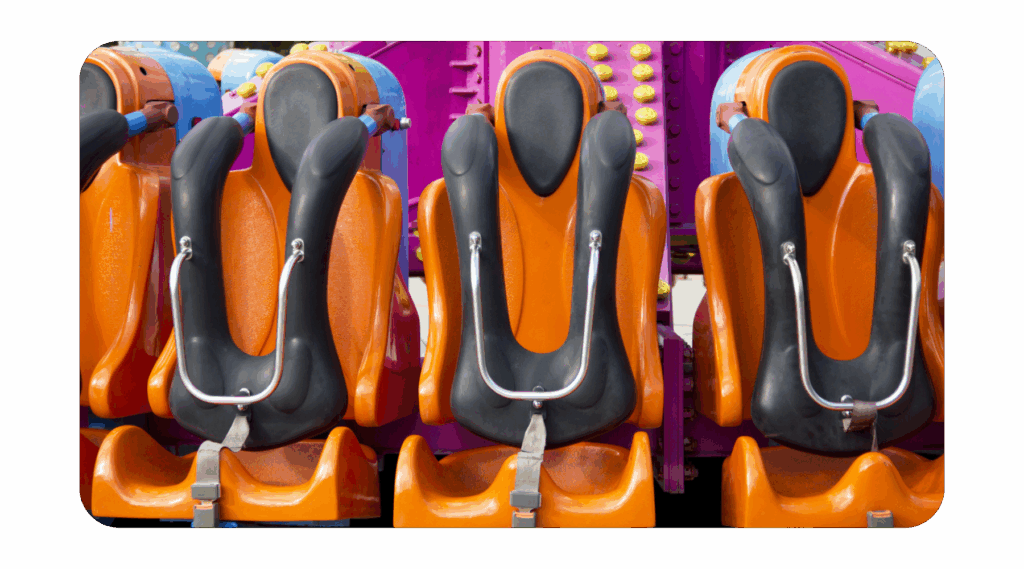What Happens If You're Injured at an Amusement Park in California
Amusement parks in California promise fun, thrills, and memorable moments. But theme park injuries are no joke. When a ride malfunctions, a walkway isn’t maintained, or an employee makes a critical mistake, the consequences can be serious. An exciting day can quickly turn into a medical emergency, leaving visitors wondering what comes next and who’s responsible.
Understanding the process after an amusement park injury isn’t just about finding out who to blame. It’s about knowing your rights, what kind of compensation may be available, and what steps you can take to protect your future. California’s legal landscape gives injured visitors important protections, but the process isn’t always straightforward, which is why the experienced theme park accident attorneys at LMS Law are here to help.
Theme Park Safety and Regulation in California
California has one of the strictest amusement ride safety programs in the country. The Division of Occupational Safety and Health (Cal/OSHA) requires annual inspections of all permanent amusement rides. Parks must keep detailed records of ride maintenance, employee training, and incident response protocols.
Still, compliance doesn’t guarantee safety. Even in a tightly regulated industry, lapses can and do happen. If a ride breaks down or a visitor is injured due to ignored warnings, faulty equipment, or negligent operation, that could become the basis of a legal claim.
How These Injuries Happen
While amusement parks are heavily regulated, accidents still occur. Some of the most common types of injuries include:
- Whiplash or spinal injuries from abrupt ride stops or restraint failures
- Slip and fall accidents due to spills, wet pavement, or uneven surfaces
- Cuts or lacerations from broken railings or poorly maintained rides
- Heat exhaustion and dehydration during hot summer days without enough shaded areas or water access
- Food poisoning from improperly stored or handled food
Some accidents are dramatic and make the news, like ride derailments or equipment collapses. Other times, the incidents are quieter, like someone slipping in a bathroom or tripping over an exposed cable. Both kinds of incidents can result in serious harm, especially for children and older adults.
Your Legal Rights as an Injured Visitor

In California, theme park operators have a duty to keep their premises reasonably safe for guests. That includes everything from ensuring rides are functioning correctly, to warning visitors of wet floors to making sure food is stored and served safely. When a park fails to uphold this duty and someone gets hurt as a result, it often falls under a legal concept called “premises liability.”
Injured park visitors may be entitled to compensation for:
- Medical expenses, including hospital stays, surgery, and follow-up care
- Lost income from time off work
- Future medical costs or reduced earning potential
- Pain and suffering—both physical and emotional
If the injury resulted from a ride malfunction, improper employee conduct, or failure to meet state safety standards, liability could fall on the park, its operators, ride manufacturers, or even maintenance contractors.
What You Should Do After an Injury at a Park
If you’re hurt at a theme park, what you do next can have a major impact on any future claim. Start by getting medical help immediately—even if you think the injury is minor. Some conditions, like concussions or soft tissue damage, can take time to show symptoms.
Notify park staff and ask to complete an incident report. This creates a record that the park can’t later deny. If you can, take photos of the area where the accident happened and get names and contact details for any witnesses nearby.
Try to keep any evidence that could help later—your admission ticket, receipts, and even food wrappers if your injury involves a meal. These details can help a lawyer reconstruct what happened and hold the responsible parties accountable.
Filing a Lawsuit Against a Park
If negotiations with a park or its insurer don’t result in fair compensation, a lawsuit may be necessary. These cases often center on proving negligence—that the park failed to act with reasonable care, and that failure led directly to your injury.
Depending on the circumstances, you might be suing not just the park itself, but also contractors, ride manufacturers, or food vendors. Each party will likely have its own legal team, which is why representation from an experienced amusement park injury lawyer is so important.
Most cases settle before trial, but if a case does go to court, your lawyer will present evidence, question witnesses, and advocate for maximum compensation. In some situations, juries may award punitive damages if the park’s actions were especially reckless.
How a Lawyer Can Help—and Why Timing Matters
Dealing with theme park injuries often requires more than filling out a few forms. Insurance companies may push for quick settlements that don’t reflect the true cost of the injury. Meanwhile, parks may try to shift the blame to avoid lawsuits.
That’s where an amusement park injury lawyer, such as the experts at LMS Law, enters the picture. A qualified attorney will help gather documentation, interview witnesses, and assess the full impact of the injury on your life. In some cases, they may bring in engineers or safety experts to evaluate ride performance or maintenance logs.
In California, there’s a statute of limitations on personal injury claims—typically two years from the date of injury. That might sound like plenty of time, but preparing a strong case takes work. The sooner you get legal advice, the better your chances of building a compelling argument.
A Path Toward Recovery
Nobody goes to an amusement park expecting to leave in an ambulance. But when something does go wrong, you’re not powerless. California law gives injured guests real tools to seek justice and recover costs. It might involve some paperwork, a few tough conversations, and a lawyer who knows how to push back when necessary, but it is possible to move forward.
If you or someone you love has been injured at a California amusement park, LMS Law is here to help. With experience in personal injury cases and a commitment to protecting the rights of injured victims, our team can guide you every step of the way—from the first consultation to the final resolution.
FAQs
Who is liable for injuries at an amusement park in California?
The amusement park may be liable if the injury was caused by negligence, unsafe conditions, or defective equipment, but liability can vary depending on the situation.
What should I do if I’m injured on a ride?
Seek immediate medical attention, report the injury to the park, and document everything, including witness information and the conditions of the ride.
Can I sue an amusement park for negligence?
Yes, you can sue for negligence if the amusement park’s actions or lack of safety measures caused your injury.
The above is not meant to be legal advice, and every case is different. Feel free to reach out to us at LMS Law if you have any questions. Information contained in this content and website should not be relied on as legal advice. You should consult an attorney for advice on your specific situation.
Visiting this site or relying on information gleaned from the site does not create an attorney-client relationship. The content on this website is the property of LMS Law and may not be used without the written consent thereof.

